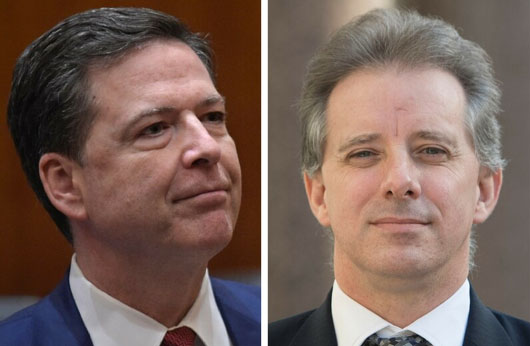by WorldTribune Staff, December 6, 2018
The FBI was aware that the intelligence community had concerns about the so-called Trump “dossier” before it was used as evidence to secure a Foreign Intelligence Surveillance Act (FISA) warrant against Carter Page, a report said. The warrant opened the way for widespread surveillance against the Trump campaign.
The revelation is said to be contained in email exchanges in 2016 between the FBI and national security officials which are part of a list of documents the House Intelligence Committee is asking President Donald Trump to declassify, according to a Dec. 5 report in The Hill by investigative reporter John Solomon.

The evidence could call into question the the FBI’s heretofore unquestioned credibility in dealings with FISA Court matters.
The email exchanges are also said to indicate the FBI had knowledge that dossier author Christopher Steele, who was then working as a confidential source for the bureau, had contacts with reporters before the FISA warrant was secured.
The targeted documents “may provide the most damning evidence to date of potential abuses of the Foreign Intelligence Surveillance Act (FISA), evidence that has been kept from the majority of members of Congress for more than two years,” sources told Solomon.
The documents House Republicans are seeking to have declassified include exchanges between then-FBI Director James Comey, key FBI investigators in the Russia probe and lawyers in the Department of Justice’s national security division, the report said.
The exchanges occurred in early to mid-October in 2016, before the FBI successfully secured a FISA warrant to spy on Page, a Trump campaign adviser.
Solomon noted that the FBI fired Steele on Nov. 1, 2016 – two weeks after securing the warrant – on the grounds that he had unauthorized contacts with the news media.
“But the FBI withheld from the American public and Congress, until months later, that Steele had been paid to find his dirt on Trump by a firm doing political opposition research for the Democratic Party and for Democratic presidential candidate Hillary Clinton, and that Steele himself harbored hatred for Trump,” Solomon wrote.
“If the FBI knew of his media contacts and the concerns about the reliability of his dossier before seeking the warrant, it would constitute a serious breach of FISA regulations and the trust that the FISA court places in the FBI.”
The FBI is obligated to certify to the court before it approves FISA warrants that its evidence is verified, and to alert the judges to any flaws in its evidence or information that suggest the target might be innocent.
The FBI used an article from Yahoo News as independent corroboration for the Steele dossier after Steele had talked to the news outlet.
“If the FBI knew Steele had that media contact before it submitted the article, it likely would be guilty of circular intelligence reporting, a forbidden tactic in which two pieces of evidence are portrayed as independent corroboration when, in fact, they originated from the same source,” Solomon wrote.
Comey had cast doubt on the Steele dossier, calling it “unverified” and “salacious” in sworn testimony before Congress.
Congressional investigators also have growing evidence that some evidence inserted into the fourth and final application for the FISA – a document signed by current Deputy Attorney General Rod Rosenstein – was suspect, the report said.
“As more of the secret evidence used to justify the Russia probe becomes public, an increasingly dark portrait of the FBI’s conduct emerges,” Solomon wrote. “Director Comey and Deputy Attorney General Rosenstein likely hold the answers, as do the still-classified documents.”
Check Out Geostrategy-Direct __________ Jump Start the U.S. Media
